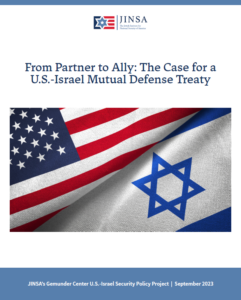From Partner to Ally: The Case for a U.S.-Israel Defense Treaty
The United States is contractually committed to the defense of 52 allies on five continents, each of which also pledges to come to America’s aid in case of attack. As the war in Ukraine illustrates, these mutual defense pacts remain crucial to upholding stability and strengthening deterrence more than seventy years after they were first created, and no war has ever broken out that threatened the existence of any U.S. treaty ally. Yet the United States has no such treaty alliance in the Middle East, despite it being one of the world’s most volatile regions that is also home to one of America’s most capable and longstanding partners anywhere: Israel.
Now, seventy-five years after Israel’s founding, a bilateral defense treaty would advance U.S. strategic interests by upgrading and cementing a longstanding pivotal military, intelligence, and high-tech relationship. It would enhance Israeli capabilities, enshrine Israel’s qualitative military edge (QME), deter existential threats, help prevent a nuclear Iran, mitigate the severity of a major conflict that involved Israel, bolster America’s global credibility, and better align Israeli policy with the United States on China and Russia – all without requiring more U.S. boots on the ground. In tandem with potential Israel-Saudi normalization, it also would build a new U.S.-led regional security architecture that leverages America’s unmatched set of partnerships across the broader Middle East to address common threats and share burdens more effectively and equably. Here at home, it also would stabilize one of America’s top security partnerships against domestic efforts to abruptly and arbitrarily condition or downgrade it.
JINSA first proposed such a pact with Israel, including a draft treaty, in 2018-19. We are now issuing this updated paper and proposed treaty text to reflect new developments, highlight the increasing importance of a treaty, and address potential concerns in both countries. In recognition of both countries’ concerns to maintain their freedom of action and avoid overextension, and especially in light of Israel’s ingrained ethos of self-defense, JINSA’s proposed treaty – like all existing U.S. mutual defense pacts – explicitly acknowledges that each ally retains its full sovereign right of freedom of military action. Moreover, given that Israel frequently is subjected to lower-level armed attacks, our proposed treaty sets a much higher threshold and would activate only under a very limited set of exceptional circumstances.
– U.S.-Israel Security Policy Project –
The JINSA Gemunder Center’s U.S.-Israel Security Policy Project examines the various ways to strengthen the U.S.-Israel security relationship amid dramatic regional changes to meet growing dangers and capitalize on new opportunities.
